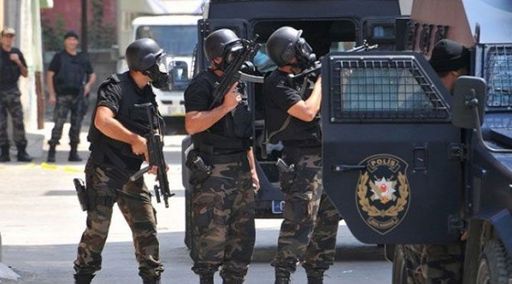
No One Would Choose to Become a Refugee
The state not only prevented people dismissed by the decree from receiving services from the healthcare system, but also took those who volunteered to help them under surveillance as members of a terrorist organization. My little daughter doesn't want to have her hair cut. Because when her father left home, she was not even 2 years old and had very little hair. Now she is 5 years old and her hair reaches down to her waist. She wants her father to see and caress her long hair when he returns. My 11-year-old daughter and I are receiving psychological support, and every day my doctor has to increase the dosage of my psychiatric medication. I can't cope with this uncertainty.
I was born in Izmir in 1988. I lived in Izmir until I went to university. I got into the nursing department and completed my education at Manisa Celal Bayar University.
A year after graduating, I got married in 2011. Since my husband was a military officer, we moved to Edirne, where he was appointed, right after our marriage. After some time, I was appointed as a nurse to the emergency department of the district we were living in. It was there that I had my first daughter. Two years later, my husband had to move to Şırnak in the eastern part of the country. However, my daughter and I had to return to Izmir because my husband would be living in a container on the mountain under harsh conditions, and it was impossible for us to stay there as a family. During these two years, my husband could only visit us every three months. After his mandatory eastern duty ended, we were transferred to Istanbul. We moved to Istanbul in 2015.
Just as we settled into our new routine, on July 15, 2016, a coup attempt happened while we were on vacation in Izmir. We learned about the coup from the television and messages sent by our relatives. The next day, all annual leaves were canceled, and we rushed back to Istanbul. We didn't know what was happening or what was going to happen.
Police officers were standing guard at the entrance of our apartment building 24/7, checking if anyone entering or leaving had an arrest warrant, and immediately detaining those who did. In the morning, a Turkish soldier in a glorious uniform could be detained as a traitor in the evening. In the first few months, passersby would throw stones at the building or verbally harass us. Wives of detained soldiers were treated like they had the plague. Meanwhile, my husband was reassigned to another district in Istanbul.
I didn't even want to go to work because, as a soldier's wife and due to the belief that the coup was carried out by soldiers, everyone was avoiding me, and even if they smiled to my face, they were talking behind my back. About three years after the coup, in December 2018, when I was 24 weeks pregnant, my husband was detained and I had no news from him for 10 days. I didn't even hear his voice. On the 10th day, the lawyer called and said that my husband was released on judicial control pending trial. The legal process had begun.
In June 2020, my husband was sentenced to 6 years and 3 months in prison for being a member of an armed terrorist organization, even though there was no real evidence in his file. In January 2021, the appellate court upheld the decision, and my husband had to flee to Iraq in February 2021. My husband's long absence in Turkey caught the attention of the people around us. They kept asking me where he was. Meanwhile, my husband had not yet been dismissed from his profession, and we were still living in the military housing. Every day a different commander would ask about my husband. I would say that he was not in a good psychological state and had gone to Izmir to be with his family to clear his mind. After a while, my husband was dismissed from his job, and we received an order to leave the military housing within 15 days. I found a house in Istanbul on my own and moved our belongings. During this time, I had to regularly go to work, manage the children's school and course schedules and explain to people why my husband wasn't helping with the move. We were kicked out of the military housing as if we were being evicted. They demanded things from me that they didn't ask from others who were moving out, like paint for the walls. Nobody helped us during the eviction from the military housing. Only my husband's family came from Izmir and thanks to their help we were able to move out of the house.
I stayed in Istanbul for another year because my working conditions were good. Although I was a nurse, I was working in the district health directorate, so I didn't have night shifts and could stay with my children at night. But during this time, the police kept calling and asking about my husband, and I noticed a few people who I thought were plainclothes officers outside my house several times. After a certain hour at night, I was afraid when the doorbell rang, worrying that if I were detained, what would happen to my children.
My superior at work was asked by higher-ups if there were any individuals in the institution whose spouse was a member of FETO or who were suspected to be members themselves. Except for a few colleagues, I began to feel severe mobbing, psychological pressure, and exclusion at my workplace.They kept sending me to different districts for assignments. During the pandemic, they wanted me to work until midnight. While others were leaving around 5-6 PM, they wouldn't allow me to leave. When I objected, they said, "We don't have to explain to you, you will work like this." Unable to withstand the pressures and living alone in Istanbul any longer, I requested a transfer to Izmir, where my family was. I was transferred to one of the busiest hospitals in Izmir. I would now have to do night shifts, but that didn't matter. All I wanted was to be able to do my job without being labeled, without feeling the pressure of others. After the transfer, I moved my belongings to Izmir, but I hadn't found a place to live yet.
Since I was mentally exhausted during this period, I took a one-year unpaid leave and started looking for a house. Meanwhile, I was staying with my parents.
One day, our lawyer called and said that the police had started administrative and physical surveillance on me and that I should be careful. Because I was providing voluntary healthcare services to families who were victims like us and was helping them financially as much as I could. The state did not only prevent people dismissed by the decree from receiving services from the healthcare system, but also took those who volunteered to help them under surveillance as members of a terrorist organization. As a human being and because of my training, I felt obligated to provide this support, knowing that every person was equal to me, and I do not regret helping.
I said goodbye to my family, packed a few small bags, and came to this country, the Netherlands, whose location I didn't even know on the map, with the first ticket I could find.
For 23 months, I've been staying in a camp with my daughters. We have changed four different camps. Each time, my children started new schools, made new friends, and had new dreams, but their dreams never came true. I tried to learn Dutch as much as I could and participated in volunteer work. I always tried to keep my motivation high. But the process, which they initially said would take six months, had dragged on for too long. After waiting for 15 months, I lost all hope. I thought about committing suicide many times and found myself unconsciously planning how to do it. Because I had no hope for my future. The only thing that stopped me was that my daughters had no one else but me. And I didn't want to cause another trauma in their already traumatic lives. My daughters haven't seen their father for more than three years. Every day/night, they ask when they will see their father. And I have no answer to give them. I don't know the answer either.
My little daughter doesn't want to have her hair cut. Because when her father left home, she was not even 2 years old and had very little hair. Now she is 5 years old and her hair reaches down to her waist. She wants her father to see and caress her long hair when he returns. My 11-year-old daughter and I are receiving psychological support, and every day my doctor has to increase the dosage of my psychiatric medication. I can't cope with this uncertainty.
My relatives didn't call or ask about me even once. Because they also believe that I am a traitor.
Believe me, no one would choose to become a refugee, no matter how beautiful the destination country is, if they felt safe in their own country...
More from author
Discover more articles by Justice for Humanity

2 mins
5
67
Being the Child of a Family Victimized by Decree-Laws -2
Na 15 juli begonnen onze buren over ons te zeggen: "Steek hun huis in brand!"
Justice for Humanity

2 mins
1
55
KHK'lı Bir Ailenin Çocuğu Olmak-2
15 Temmuz’dan sonra komşularımız bizim için “Bunların evini yakın!” demeye başladılar.
Justice for Humanity

